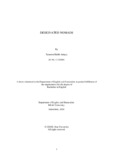Designated Nomads

View/Open
Date
2020-09Publisher
Brac UniversityAuthor
Aniqua, Tasneem HabibMetadata
Show full item recordAbstract
As a response to the refugee crisis that occurred as an aftereffect of the World War II, the United Nations Organisation had created the United Nation High Commissioner for Refugees in 1951. The 20th century has witnessed the surge of refugees flowing into sheltering countries which have never been observed before. Starting from the fleeing of Armenians and Russians, Greeks, Turks, Jews, Syrians and Afghanistan, South Sudanese and Somalia, Venezuelans, the Rohingya massacre and so much more, the 20th century has seen catastrophes and death in settling and sheltering camps, riots and violence between natives and refugees. People do not remember the pride of being able to help these displaced beings; rather they remember the hostility and discrimination from natives and misconceptions portrayed through media. Behind the numbers and statistics, these are people who are filled with dreams of a safe future, security for family and stable livelihood and home. Looking at an uncertain future, these people are unheard voices of the minorities. Literature attempts to shed light on the unheard voices through narrating their stories, while anthropological research reveals the condition they live in. Combining both allows people to look at the refugee crisis far different from what have been portrayed by media.
Keywords
Refugees and Natives; Trauma; Hostility; Othering; Media Portrayal; Cultural relativism; Refugee camps and bordersDescription
This thesis is submitted in partial fulfillment of the requirements for the degree of Bachelor of Arts in English, 2020.Department
Department of English and Humanities, Brac UniversityType
ThesisCollections
- Thesis, B.A. (English) [652]
